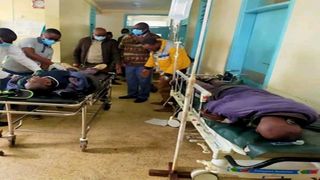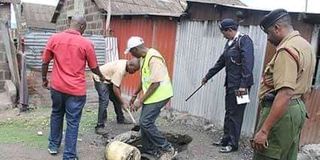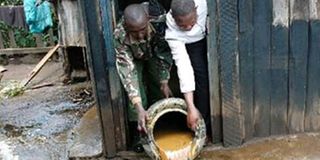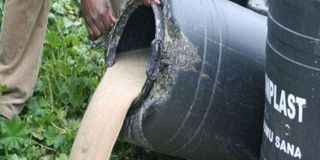
Some of the nine people who fell sick after drinking adulterated alcohol are treated at Nyahururu County Referral Hospital in Laikipia County, on July 11, 2021.
Counties
Premium
Illicit alcohol returns to Rift towns, turning youths into zombies
What you need to know:
- Cheap liquor and illicit traditional brews are slowly making a comeback in various parts of Nakuru, Narok, Nyandarua, Kericho, Laikipia and Baringo counties, among others, killing people and turning young men into zombies.
The Bondeni slum in Nakuru East constituency is an isle of secrets. Besides being home to the criminal gangs that terrorise Nakuru residents, it is the de facto capital of illicit booze in the region.
Here, hard drugs and illicit liquor are hawked even in food kiosks.
Though police profiled the informal settlement as a crime hotspot, says resident James Karanja, it is a safe haven for brewing chang'aa and busaa, the traditional illicit brews also common in rural areas.
Unlicensed outlets selling adulterated alcohol have also found home here.
The problem, he says, is that the traditional brews are normally mixed with lethal concoctions by dealers in a bid to make more profits and attract clientele.
“A majority of youth here are unemployed and engaged in crime, selling drugs and illicit liquor or both, while law enforcement agencies have turned a blind eye on the vices,” he says.
“Bondeni is located a few metres from the Bondeni Police Station. But police here look the other way, only coming back to collect some fee from those involved in the trade.”
There are more litres of illicit liquor, chang’aa and busaa than there is water in this slum, locals say.
This is just an example of what is happening in several parts of the South Rift.
Cheap liquor and illicit traditional brews are slowly making a comeback in various parts of Nakuru, Narok, Nyandarua, Kericho, Laikipia and Baringo counties, among others, killing people and turning young men into zombies.

Nakuru Town East Sub county Police commander Ellena Kabukuru leads a recent crackdown against illicit brews in Bondeni and Flamingo estates.
Worst hit areas
In Nakuru County, for instance, informal settlements in its towns are the worst hit by the trade.
In Nakuru town, the trade has retreated to the slums of Kaptembwa, Kivumbini, Kwa Rhonda, Kwa Murogi, Kanyon, London and other areas.
Other affected areas are Molo, Elburgon and Subukia.
Independent investigations by the Nation have established that those engaging in the trade had devised innovative and unconventional ways of doing their business without raising suspicions.
In Nakuru town, for instance, it emerged that the illegal trade also takes place in odd places, including inside toilets, cemeteries and other secluded places.
Informal settlements are also the worst hit by the illicit brew trade. Here the liquor is sold in sachets in dark alleys, away from the police and administrators.
The proliferation of unlicensed outlets selling adulterated alcohol also pose danger to consumers.
In Elburgon, residents said, the business had left heavy hearts in elderly parents, who have had to bury their young children after they consumed the lethal substances.
Jane Wanjiku, 66, from Elburgon, for example, told the Nation that her son was found dead on a road earlier this year.
“He was a drunkard and our efforts to have him change the habit had failed. On the fateful day, he drank a lot of alcohol without eating,” she says.
Another resident, Charity Kemboi, says illegal alcohol had turned young men into zombies.
“I have a son who cannot bathe or eat properly. I fear losing him to illicit liquor. Most of the young men here cannot marry because hawawezi kazi,” the 70-year-old grandmother says.
In Elburgon it is common to see staggering young men in tattered clothes openly ferrying jerricans of chang’aa from one household to another and sometimes to a waiting motor vehicle.
The costs
A resident told the Nation that they are paid with two glasses of chang’aa after delivering the booze.
A glass goes for Sh20, while a 200-litre tank is sold for between Sh3,000 and Sh5,000, locals said.
In Nakuru, the return of illicit liquor worries Governor Lee Kinyanjui, who has declared war on illegally brewed alcohol and vowed to revoke the licences of bars selling lethal liquor and destroy their stocks of the beverages.
“The continued sale of the lethal illicit brews in our urban centres is a major concern. Most of our youth have been rendered socially and economically unproductive,” he says in a press statement issued on Friday.
“In Nakuru, I am putting those behind the proliferation of the illicit drinks on notice. We will flush you out as we want our youth to remain focused and to engage in meaningful development.”
The county boss has called for a meeting with the regional security committee to deliberate on a fresh crackdown of illicit liquor.
Despite frequent crackdowns on the sale of illicit alcohol and tough talk by authorities in some parts of the county, the Nation established that those engaging in the trade have devised new ways of conducting their business without raising suspicions.
In Nyahururu, Laikipia County, the sale of illicit adulterated alcohol continues unabated in various licensed outlets.
The Kiamaina slums on the outskirts of the town are the most affected.
Here lethal, dangerous concoctions are sold to locals, especially the youth.

Illicit brew is poured out during a recent crackdown in Bondeni and Flamingo estates of Nakuru County.
Several deaths
In the most recent incident, on July 12, one person died after reportedly consuming adulterated liquor. Nine others were left fighting for their lives at Nyahururu County Referral Hospital.
Laikipia Health Chief Officer Dr Donald Mugoi said the 10 men were part of a group who consumed two liquor brands during a birthday party at a pub in the town. The nine were admitted in the hospital after developing vomiting and stomach complications.
Authorities could not immediately confirm the chemical that the liquor had been laced with or the quantity the 10 had consumed. Samples had been taken to the government chemist for testing.
Medics at the hospital said most of the patients were treated for poisoning and discharged.
The popular pub continues to operate, even after the incident.
In Nyahururu the trade is conducted in dark places and informal settlements, including Manguo and Kiamaina estates, which are densely populated.
The situation is the same in Narok town, where dealers in the trade in areas like Majengo estate have devised ways to keep law enforcers at bay.
In the estate the liquor is sold in sachets in dark alleys away from the police and administrators.
The situation is the same in Olakalou, Engineer, Njabini and Mirangine.
Other affected regions are Baringo and Kericho.
Huge operation
Rift Valley Regional Coordinator George Natembeya says he has formed a multi-agency team to fight the trade and issued a warning to those abetting it, including chiefs.
He directed administrators, including chiefs and their assistants, and county commissioners from the 14 counties in the region to launch a joint, sustained fight against the trade.
“We have devised ways of getting information about illicit brew dens and hideouts. We shall follow them and arrest them. We won’t relent in the fight against illicit brew,” Mr Natembeya says.
“We will intensify crackdowns against the trade and will arrest those involved to end the trade in the region. I urge governors to ensure only licensed liquor outlets operate in the Rift Valley region.”
He said he was working with his juniors to draw up more strategies for closing all outlets selling illicit liquor.
The Nation also established that at the Nakuru, Molo, Naivasha law courts, an average of 10 people are charged every day with either being found drunk and disorderly in public places, selling sub-standard brews or selling alcohol without a licence.
But a gap in the law that allows for small fines on people found guilty of the offences has been blamed for the continuing operation of the business.
Those found guilty of selling alcohol that does not meet quality standards and without a licence are fined between Sh10,000 and Sh20,000.
“Normally those found drunk and disorderly are disciplined by being directed to do community service work at the law courts for a day or two,” a court official told the Nation.
Cases of law enforcers colluding with brewers have also been cited as undermining the battle to end the trade.
It has emerged that many of the infamous alcoholic hubs are, ironically, located near police posts but law enforcers turn a blind eye to them.
For instance, Kanyon in Nakuru town where the sale of illicit brew is booming is a few metres from the Bondeni Police Station.

Illicit brew is poured out during a recent crackdown in Bondeni and Flamingo estates of Nakuru County.
Backdoor licences
In Nakuru, local leaders and youth groups have complained that illicit brews had returned to the market, alleging that some were getting licensed through backdoor means.
“It is sad that drugs that were banned are now finding their way back to the market but now with licences obtained through backdoor means. We have even worse situations where bars have been licensed to operate next to schools,” said Jesse Karanja, Peoples’ Power Watch lobby group chairman.
“I petition the Ministry of Interior to intervene, tighten the noose and eliminate cartels that smuggle alcohol using fake Kenya Revenue Authority (KRA) stamps into various parts of the country.”
The group warned that the killer brews would get deeply rooted in the society again if immediate action is not taken.
Nakuru County Speaker Joel Kairo says a committee formed to conduct research on alcoholism in the county during the previous administration would be reinstated to enhance the campaign against the dangerous enterprise.
Nationwide crackdown
When President Uhuru Kenyatta ordered a countrywide crackdown on illicit brew dens in 2015, much success was recorded in stopping the trade that he described as “a business of death”.
He also banned the sale and consumption of illegal alcohol after various outlets dealing in the trade were stormed and destroyed.
But about five years later, the brews are creeping back to various parts of Nakuru, Narok, Nyandarua, Kericho, Laikipia, Baringo and other counties, killing people and turning young men into zombies.
Independent investigations by the Nation have established that those engaging in the trade had devised innovative and unconventional ways of conducting their business without raising suspicions.
According to medics, methanol, which normally is found in adulterated alcohol, leads to brain, heart and nervous system depression, which ultimately leads to multiple organ failure and ultimately death.





